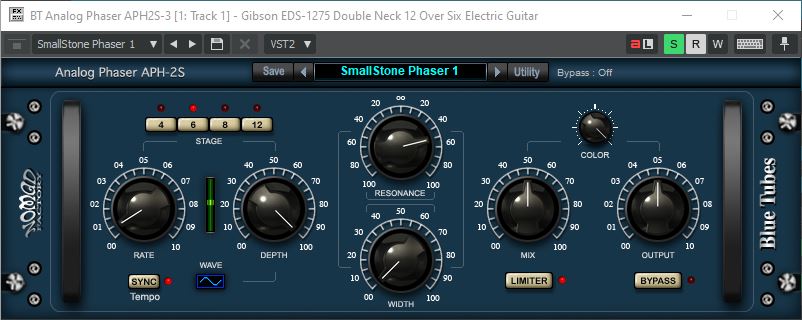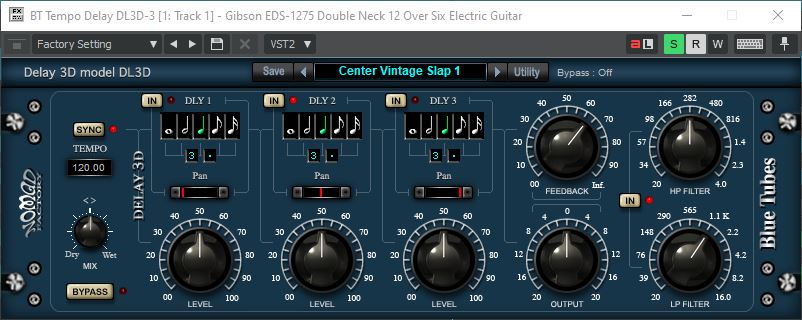“Odious Olfaction” is a MP3 that used Universal Audio Effect Minimoog Emulator recorded by SONAR Platinum. The guitar effects utilized were TH3 Noise Reduction, Chorus, Overdrive, Digital Delay, Spring Reverb, Fender Twin Reverb Emulator. The MIDI audio effect was the Cakewalk Arpeggiator. The Minimoog patch was 2 Classic Oscillators.
Category: Computer Generated Music
Guitar Synth Experiment 04 17 2024 (c) James Pate Williams, Jr.
Dyadic UADx Waterfall Hammond B3 Organ Experiment in Progress (c) James Pate Williams, Jr. Wednesday, April 17, 2024
A New and Some Old MP3s by James Pate Williams, Jr. Copyrighted on Easter Sunday, March 31, 2024
The first MP3 was created on Saturday, March 30,2024. It uses the former Cakewalk Digital Audio Workstation software SONAR Platinum. The software synthesizer utilized was Universal Audio Waterfall Hammond B3 Organ emulator with Lesley Type 147 amplifier and rotating speaker enclosure.
The second MP3 was created on May 19,2009, using my Gibson EDS-1275 double neck SG guitar and one of the older Cakewalk DAWs. Unfortunately, my double neck guitar was stolen from my house in 2011.
The final MP3 in this post uses my 2006 Gibson Les Paul SG Custom. The date on the MP3 is Thursday, February 15, 2018.
The next MP3 is the same music as the first MP3 but using Universal Audio’s Mini Moog synthesizer with Fanfare preset.
Open Assault on the Fret Board (c) February 3, 2024, by James Pate Williams, Jr. Using Universal Audio’s Waterfall B3 Hammond Organ Software Emulator with Nomad Factory VST2 Audio Effects in SONAR Platinum Digital Audio Workstation
Up and Down the Stairway to Another Realm Instrumental Rock (c) January 31, 2024, by James Pate Williams, Jr. Using SONAR Platinum and the Universal Audio MOOG Mini-Moog Plug-In
Guitar String and Piano Key Frequencies by James Pate Williams, Jr.
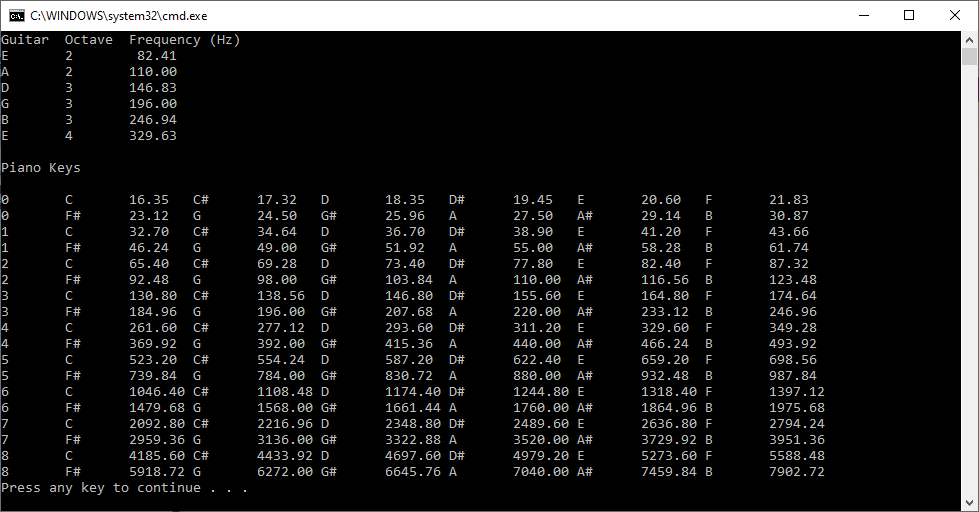
// FrequencyKey.cpp : Defines the entry point for the console application.
// James Pate Willims, Jr. (c) All Applicable Rights Reserved
#include "stdafx.h"
#include <math.h>
#include <iomanip>
#include <iostream>
#include <string>
#include <vector>
using namespace std;
vector<string> pnote;
double a = pow(2.0, 1.0 / 12.0);
double f0 = 440.0, gStrF[6];
double e2, a2, d3, g3, b3, e4;
double pfreq[9 * 12];
int offset = 0;
double fn(int n)
{
return f0 * pow(a, n);
}
void printFrequency(char note, int octave, double frequency)
{
cout << note << "\t" << octave << "\t";
cout << setw(6) << fixed << setprecision(2);
cout << frequency << endl;
}
int main()
{
for (int octave = 0; octave <= 8; octave++)
{
pnote.push_back("C");
pnote.push_back("C#");
pnote.push_back("D");
pnote.push_back("D#");
pnote.push_back("E");
pnote.push_back("F");
pnote.push_back("F#");
pnote.push_back("G");
pnote.push_back("G#");
pnote.push_back("A");
pnote.push_back("A#");
pnote.push_back("B");
}
pfreq[0] = 16.35;
pfreq[1] = 17.32;
pfreq[2] = 18.35;
pfreq[3] = 19.45;
pfreq[4] = 20.6;
pfreq[5] = 21.83;
pfreq[6] = 23.12;
pfreq[7] = 24.5;
pfreq[8] = 25.96;
pfreq[9] = 27.5;
pfreq[10] = 29.14;
pfreq[11] = 30.87;
for (int octave = 1; octave <= 8; octave++)
{
for (int i = 0; i < 12; i++)
{
pfreq[octave * 12 + i] = 2.0 * pfreq[(octave - 1) * 12 + i];
}
}
gStrF[0] = e2 = fn(offset - 29);
gStrF[1] = a2 = fn(offset - 24);
gStrF[2] = d3 = fn(offset - 19);
gStrF[3] = g3 = fn(offset - 14);
gStrF[4] = b3 = fn(offset - 10);
gStrF[5] = e4 = fn(offset - 5);
cout << "Guitar\tOctave\tFrequency (Hz)" << endl;
printFrequency('E', 2, e2);
printFrequency('A', 2, a2);
printFrequency('D', 3, d3);
printFrequency('G', 3, g3);
printFrequency('B', 3, b3);
printFrequency('E', 4, e4);
cout << endl;
cout << "Piano Keys" << endl << endl;
for (int octave = 0; octave <= 8; octave++)
{
for (int i = 0; i < 2; i++)
{
cout << octave << '\t';
for (int j = 0; j < 6; j++)
{
{
cout << pnote[(12 * octave + 6 * i + j) % 12] << '\t';
cout << pfreq[(12 * octave + 6 * i + j)] << '\t';
}
}
cout << endl;
}
}
return 0;
}
Comparison of Brent’s Modification of the Pollard rho Factoring Method and the Original Pollard rho Method C# Implementations by James Pate Williams, Jr.
27-Decimal Digit Number 123456789012345678901234567

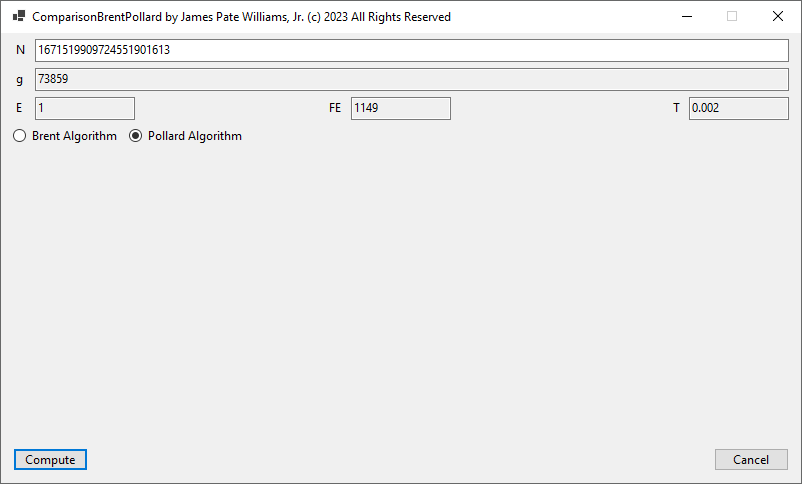
31-Digit Decimal Number 1234567890123456789012345678901 Pollard Failed


The same factorizations by the Classical Shor-Pollard- James Pate Williams, Jr. algorithm.
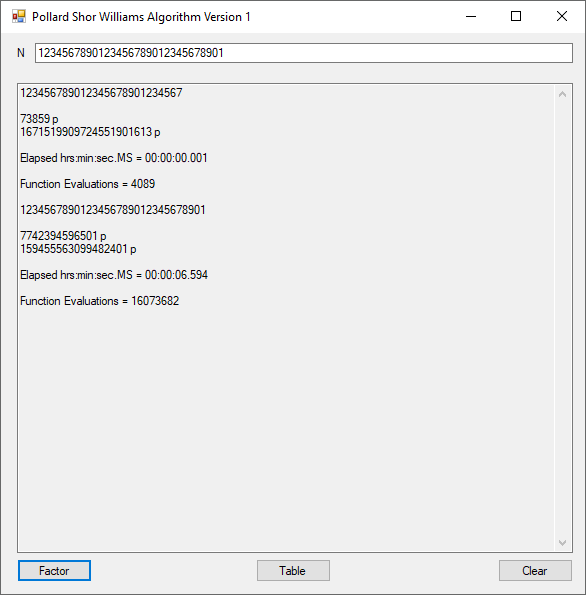
Six Large Integer Factoring Methods Using Arjen K. Lenstra’s Free Large Integer Package (Free LIP) by James Pate Wiliams, Jr.
This C code uses singly linked lists as the key data structure. The factoring methods are trial division, Brent’s modification of the well-known Pollard rho method, Cohen-Pollard p – 1 algorithm first stage, Lehman’s method, Cohen’s algorithm for the Lenstra’s elliptic curve method, and the Free LIP elliptic curve method. I include a couple of sample factorizations by the Free LIP built-in Lenstra elliptic curve method. These include the seventh Fermat number 2^128+1 and the eighth Fermat number 2^256+1.
/*
Author: Pate Williams (c) 1997
Algorithm 8.4.1 (Lehman). See "A Course in
Computational Algebraic Number Theory" by
Henri Cohen page 425.
Author: Pate Williams (c) 1997 - 2022
Algorithm 8.5.2 (Pollard rho). See "A Course in
Computational Algebraic Number Theory" by Henri
Cohen page 429.
Author: Pate Williams (c) 1997 - 2022
Algorithm 8.8.2 (p - 1 First Stage). See "A Course
in Computational Algebraic Number Theory" by Henri
Cohen page 439.
Author: Pate Williams (c) 1997 - 2022
Algorithm 10.3.3 (Lenstra's ECM). See "A Course
in Computational Algebraic Number Theory" by
Henri Cohen page 488.
*/
#include "LIP_data_structures.h"
#include <crtdbg.h>
#ifndef CLK_TCK
#define CLK_TCK CLOCKS_PER_SEC
#endif
typedef struct myThreadData
{
int zacount;
verylong zn;
PFACTORNODE current;
PFACTORNODE first;
PFACTORNODE(*tdFunction)(
verylong*,
PFACTORNODE,
int*);
} THREADDATA, *PTHREADDATA;
DWORD WINAPI TdThread(LPVOID lpParam)
{
clock_t time0 = clock();
PTHREADDATA td = (PTHREADDATA)lpParam;
PFACTORNODE head = td->first;
td->current = td->tdFunction(
&td->zn, td->first, &td->zacount);
td->first = td->current;
PFACTORNODE last = find_last(td->first);
quick_sort(td->first, last);
if (td->first != NULL)
{
while (td->first != NULL)
{
if (zprobprime(td->first->factor.zfactor, 20))
{
zwrite(td->first->factor.zfactor);
if (td->first->factor.exponent > 1)
printf(" ^ %d ", td->first->factor.exponent);
printf("\n");
}
td->first = td->first->next;
}
}
PFACTORNODE ptr = head;
while (ptr != NULL)
{
ptr = delete_factor_node(head);
head = ptr;
}
double time = (clock() - time0) / (double)CLK_TCK;
printf("total time required: %f seconds\n", time);
return TRUE;
}
int main()
{
int i = 0, zacount = 0;
verylong zN = 0, zf = 0, zn = 0, zo = 0;
verylong zaddend = 0, zbase = 0, ztemp = 0;
verylong zq = 0, zr = 0, zs = 0;
PFACTORNODE current = NULL, first = NULL;
while (1)
{
char optionStr[256], numStr[256] = { 0 }, option, *bPtr, *ePtr;
int base, expon, addend, iExpon = 0, positive;
printf("Menu\n");
printf("1 Trial Division\n");
printf("2 Brent-Pollard rho Method\n");
printf("3 Cohen-Pollard p - 1 Method\n");
printf("4 Lehman's Method\n");
printf("5 Cohen Lenstra's Elliptic Curve Method\n");
printf("6 FreeLIP Lenstra's Elliptic Curve Method\n");
printf("7 Exit\n");
printf("Enter choice (1 - 7): ");
scanf_s("%s", optionStr, 256);
option = optionStr[0];
zone(&zo);
if (option == '7')
break;
if (option < '1' || option > '6')
{
printf("Unknown choice, please reenter choice\n");
continue;
}
printf("enter the number below (0 to quit):\n");
scanf_s("%s", numStr, 256);
bPtr = strchr(numStr, '^');
if (bPtr != NULL)
{
*bPtr = '\0';
base = atoi(numStr);
ePtr = strchr(bPtr + 1, '+');
if (ePtr != NULL)
positive = 1;
else {
ePtr = strchr(bPtr + 1, '-');
if (ePtr != NULL)
positive = 0;
}
if (ePtr != NULL)
*ePtr = '\0';
expon = atoi(bPtr + 1);
if (ePtr != NULL) {
addend = atoi(ePtr + 1);
if (positive == 0)
addend = -addend;
}
else
addend = 0;
zintoz(base, &zbase);
zintoz(addend, &zaddend);
zsexp(zbase, expon, &ztemp);
zadd(ztemp, zaddend, &zN);
numStr[0] = '\0';
}
else
zstrtoz(numStr, &zN);
zcopy(zN, &zn);
if (zmcomposite(zn, 20) == 0)
{
printf("Number is prime\n");
continue;
}
first = insert_first_factor_node(zo, 0);
zacount = 1;
DWORD dwMilliseconds;
PTHREADDATA pThreadData = (PTHREADDATA)
malloc(sizeof(THREADDATA));
if (pThreadData == NULL)
exit(0);
memset(pThreadData, 0, sizeof(THREADDATA));
pThreadData->current = NULL;
pThreadData->first = first;
pThreadData->zacount = 1;
zcopy(zn, &pThreadData->zn);
printf("Wait milliseconds = ");
scanf_s("%ld", &dwMilliseconds);
if (option == '1')
{
pThreadData->tdFunction = trial_division;
DWORD threadId;
HANDLE hMutex = CreateMutex(
NULL, FALSE, NULL);
if (hMutex == NULL)
exit(0);
HANDLE thread = CreateThread(
NULL,
0,
(LPTHREAD_START_ROUTINE)TdThread,
pThreadData,
0,
&threadId);
WaitForSingleObject(thread, dwMilliseconds);
CloseHandle(thread);
CloseHandle(hMutex);
}
else if (option == '2')
{
pThreadData->tdFunction = Brent_Pollard_Method;
DWORD threadId;
HANDLE hMutex = CreateMutex(
NULL, FALSE, NULL);
if (hMutex == NULL)
exit(0);
HANDLE thread = CreateThread(
NULL,
0,
(LPTHREAD_START_ROUTINE)TdThread,
pThreadData,
0,
&threadId);
if (thread == NULL)
exit(0);
WaitForSingleObject(thread, dwMilliseconds);
CloseHandle(thread);
CloseHandle(hMutex);
}
else if (option == '3')
{
pThreadData->tdFunction = Cohen_Pollard_Method;
DWORD threadId;
HANDLE hMutex = CreateMutex(
NULL, FALSE, NULL);
if (hMutex == NULL)
exit(0);
HANDLE thread = CreateThread(
NULL,
0,
(LPTHREAD_START_ROUTINE)TdThread,
pThreadData,
0,
&threadId);
WaitForSingleObject(thread, dwMilliseconds);
CloseHandle(thread);
CloseHandle(hMutex);
}
else if (option == '4')
{
pThreadData->tdFunction = Lehman;
DWORD threadId;
HANDLE hMutex = CreateMutex(
NULL, FALSE, NULL);
if (hMutex == NULL)
exit(0);
HANDLE thread = CreateThread(
NULL,
0,
(LPTHREAD_START_ROUTINE)TdThread,
pThreadData,
0,
&threadId);
WaitForSingleObject(thread, dwMilliseconds);
CloseHandle(thread);
CloseHandle(hMutex);
}
else if (option == '5')
{
first = CohenEllipticCurveMethod(
numStr, base, expon, addend);
}
else if (option == '6')
{
pThreadData->tdFunction = LenstraEllipticCurveMethod;
DWORD threadId;
HANDLE hMutex = CreateMutex(
NULL, FALSE, NULL);
if (hMutex == NULL)
exit(0);
HANDLE thread = CreateThread(
NULL,
0,
(LPTHREAD_START_ROUTINE)TdThread,
pThreadData,
0,
&threadId);
WaitForSingleObject(thread, dwMilliseconds);
CloseHandle(thread);
CloseHandle(hMutex);
}
zfree(&pThreadData->zn);
free(pThreadData);
}
zfree(&zaddend);
zfree(&zbase);
zfree(&ztemp);
zfree(&zN);
zfree(&zf);
zfree(&zn);
zfree(&zo);
zfree(&zq);
zfree(&zr);
zfree(&zs);
return 1;
}
#pragma once
#include "..\LIPFactoring\lip.h"
#include <stdio.h>
#include <stdlib.h>
#include <string.h>
#include <time.h>
#define my_B 1000000l
#define my_NUMBER_PRIMES 78498l
#define my_BOUND 100000000l
/* https://www.tutorialspoint.com/data_structures_algorithms/linked_list_program_in_c.htm */
/* https://www.geeksforgeeks.org/quicksort-on-singly-linked-list */
typedef struct my_factor
{
long exponent; // secondary storage key
verylong zfactor; // primary storage key
} FACTOR, *PFACTOR;
typedef struct my_factor_node
{
FACTOR factor;
struct my_factor_node* next;
} FACTORNODE, *PFACTORNODE;
/* basic singly linked list functions
** the c means complete comparison including
** the exponents of the factor or factor_node
** s denotes a shallow comparison */
int factor_z_compare_c(FACTOR lt, FACTOR rt);
int factor_z_compare_s(FACTOR lt, FACTOR rt);
int factor_node_z_compare_c(FACTORNODE lt, FACTORNODE rt);
int factor_node_z_compare_s(FACTORNODE lt, FACTORNODE rt);
PFACTORNODE insert_first_factor_node(verylong zf, int exponent);
PFACTORNODE insert_factor_node(PFACTORNODE current, FACTOR factor);
PFACTORNODE delete_factor_node(PFACTORNODE first);
PFACTORNODE linear_search_factor_c(PFACTORNODE first, FACTOR factor);
PFACTORNODE linear_search_factor_s(PFACTORNODE first, FACTOR factor);
void reverse(PFACTORNODE* first_ref);
// old school factoring algorithms
PFACTORNODE trial_division(verylong *zN, PFACTORNODE fn, int *count);
int trial_division_1(long B, verylong *zN, verylong *zf);
PFACTORNODE Brent_Pollard_Method(verylong *zN, PFACTORNODE fn, int *count);
PFACTORNODE Cohen_Pollard_Method(verylong *zN, PFACTORNODE fn, int *count);
PFACTORNODE Lehman(verylong *zN, PFACTORNODE fn, int *count);
PFACTORNODE find_last(PFACTORNODE first);
void quick_sort(PFACTORNODE first, PFACTORNODE last);
/* Lenstra's Elliptic Curve Method define and point structure */
#define CURVES 1024l
typedef struct ec_point
{
verylong zx, zy, zz;
} ECPOINT, *PECPOINT;
PFACTORNODE CohenEllipticCurveMethod(
char *numStr, int base, int expon, int addend);
PFACTORNODE LenstraEllipticCurveMethod(
verylong *zN, PFACTORNODE first, int *count);
#include "LIP_data_structures.h"
/* complete factor comparison */
int factor_z_compare_c(FACTOR lt, FACTOR rt)
{
verylong zlt, zrt;
zcopy(lt.zfactor, &zlt);
zcopy(rt.zfactor, &zrt);
int zc = zcompare(zlt, zrt);
if (zc > 0)
return +1;
if (zc < 0)
return -1;
if (lt.exponent < rt.exponent)
return -1;
if (lt.exponent > rt.exponent)
return -1;
return 0;
}
/* shallow factor comparison */
int factor_z_compare_s(FACTOR lt, FACTOR rt)
{
verylong zlt = 0, zrt = 0;
zcopy(lt.zfactor, &zlt);
zcopy(rt.zfactor, &zrt);
int zc = zcompare(zlt, zrt);
if (zc > 0)
return +1;
if (zc < 0)
return -1;
return 0;
}
/* complete factor_node comparison */
int factor_node_z_compare_c(FACTORNODE lt, FACTORNODE rt)
{
verylong zlt, zrt;
zcopy(lt.factor.zfactor, &zlt);
zcopy(rt.factor.zfactor, &zrt);
int zc = zcompare(zlt, zrt);
if (zc > 0)
return +1;
if (zc < 0)
return -1;
if (lt.factor.exponent < rt.factor.exponent)
return -1;
if (lt.factor.exponent > rt.factor.exponent)
return -1;
return 0;
}
/* shallow factor node comparison */
int factor_node_z_compare_s(FACTORNODE lt, FACTORNODE rt)
{
verylong zlt, zrt;
zcopy(lt.factor.zfactor, &zlt);
zcopy(rt.factor.zfactor, &zrt);
int zc = zcompare(zlt, zrt);
if (zc > 0)
return +1;
if (zc < 0)
return -1;
return 0;
}
/* returns the first factor node */
PFACTORNODE insert_first_factor_node(verylong zf, int exponent)
{
PFACTORNODE first = (PFACTORNODE) malloc(sizeof(FACTORNODE));
memset(first, 0, sizeof(FACTORNODE));
zcopy(zf, &first->factor.zfactor);
first->factor.exponent = exponent;
first->next = NULL;
return first;
}
/* insert a factor node in order */
PFACTORNODE insert_factor_node(PFACTORNODE first, FACTOR factor)
{
if (first == NULL)
return NULL;
PFACTORNODE next = (PFACTORNODE)malloc(sizeof(FACTORNODE));
memset(next, 0, sizeof(FACTORNODE));
next->factor.exponent = factor.exponent;
zcopy(factor.zfactor, &next->factor.zfactor);
next->next = first;
return next;
}
PFACTORNODE delete_factor_node(PFACTORNODE first)
{
if (first == NULL)
return NULL;
PFACTORNODE toDelete = first;
first = first->next;
zfree(&toDelete->factor.zfactor);
free(toDelete);
return first;
}
PFACTORNODE linear_search_factor_c(PFACTORNODE first, FACTOR factor)
{
int found = 0;
PFACTORNODE ptr = first;
if (ptr == NULL)
return NULL;
do
{
found = factor_z_compare_c(ptr->factor, factor);
if (found == 0)
return ptr;
else
ptr = ptr->next;
} while (ptr != NULL);
return NULL;
}
void reverse(PFACTORNODE* first_ref)
{
PFACTORNODE prev = NULL;
PFACTORNODE current = *first_ref;
PFACTORNODE next;
while (current != NULL) {
next = current->next;
current->next = prev;
prev = current;
current = next;
}
*first_ref = prev;
}
PFACTORNODE linear_search_factor_s(PFACTORNODE first, FACTOR factor)
{
int found = 0;
PFACTORNODE ptr = first;
if (ptr == NULL)
return NULL;
do
{
found = factor_z_compare_s(ptr->factor, factor);
if (found == 0)
return ptr;
else
ptr = ptr->next;
} while (ptr != NULL);
return NULL;
}
PFACTORNODE partition(PFACTORNODE first, PFACTORNODE last)
{
if (first == last || first == NULL || last == NULL)
return first;
PFACTORNODE pivot = first;
PFACTORNODE front = first;
FACTOR temp;
while (front != NULL && front != last)
{
if (zcompare(
front->factor.zfactor, last->factor.zfactor) < 0) {
pivot = first;
temp = first->factor;
first->factor = front->factor;
front->factor = temp;
first = first->next;
}
front = front->next;
}
temp = first->factor;
first->factor = last->factor;
last->factor = temp;
return pivot;
}
PFACTORNODE find_last(PFACTORNODE first)
{
while (first->next != NULL)
{
first = first->next;
}
return first;
}
void quick_sort(PFACTORNODE first, PFACTORNODE last)
{
if (first == last) {
return;
}
PFACTORNODE pivot = partition(first, last);
if (pivot != NULL && pivot->next != NULL) {
quick_sort(pivot->next, last);
}
if (pivot != NULL && first != pivot) {
quick_sort(first, pivot);
}
}
PFACTORNODE do_Brent_Pollard(verylong *zN, PFACTORNODE first, int *count)
{
int e, one, pr;
long c, i, k, l;
verylong zP = 0, za = 0, zb = 0, zg = 0, zn = 0;
verylong zx = 0, zx1 = 0, zy = 0;
FACTOR factor;
PFACTORNODE current = NULL;
zcopy(*zN, &zn);
do {
c = 0, k = l = 1;
zone(&zP);
zintoz(2l, &zy);
zintoz(2l, &zx);
zintoz(2l, &zx1);
L2:
zsq(zx, &za);
zsadd(za, 1l, &zb);
zmod(zb, zn, &zx);
zsub(zx1, zx, &za);
zmulmod(za, zP, zn, &zb);
zcopy(zb, &zP);
if (++c == 20) {
zgcd(zP, zn, &zg);
if (zscompare(zg, 1l) > 0)
goto L4;
zcopy(zx, &zy);
c = 0;
}
if (--k != 0)
goto L2;
zgcd(zP, zn, &zg);
if (zscompare(zg, 1l) > 0)
goto L4;
zcopy(zx, &zx1);
k = l, l *= 2;
for (i = 0; i < k; i++)
{
zsq(zx, &za);
zsadd(za, 1l, &zb);
zmod(zb, zn, &zx);
}
zcopy(zx, &zy);
c = 0;
goto L2;
L4:
do {
zsq(zy, &za);
zsadd(za, 1l, &zb);
zmod(zb, zn, &zy);
zsub(zx1, zy, &za);
zgcd(za, zn, &zg);
} while (zscompare(zg, 1l) == 0);
if (zcompare(zg, zn) == 0)
{
fprintf(stderr, "fatal error\nBrent's method failed\n");
exit(1);
}
if (!zprobprime(zg, 20l))
{
zcopy(zg, &za);
if ((current = trial_division(&zg, first, count)) == NULL) {
fprintf(stderr, "fatal error\ncould not trial divide\n");
exit(1);
}
first = current;
zcopy(za, &zg);
zdiv(zn, zg, &za, &zb);
zcopy(za, &zn);
}
else
{
e = 0;
do {
zdiv(zn, zg, &za, &zb);
zcopy(za, &zn);
zmod(zn, zg, &za);
e++;
} while (zscompare(za, 0l) == 0);
if (first != NULL)
{
factor.exponent = e;
factor.zfactor = 0;
zcopy(zg, &factor.zfactor);
current = insert_factor_node(first, factor);
first = current;
*count = *count + 1;
}
}
one = zscompare(zn, 1l) == 0;
if (!one)
{
pr = zprobprime(zn, 20l);
if (pr)
{
factor.exponent = 1;
factor.zfactor = 0;
zcopy(zn, &factor.zfactor);
current = insert_factor_node(first, factor);
first = current;
break;
}
}
} while (!one);
zfree(&zP);
zfree(&za);
zfree(&zb);
zfree(&zg);
zfree(&zn);
zfree(&zx);
zfree(&zx1);
zfree(&zy);
return first;
}
PFACTORNODE Brent_Pollard_Method(
verylong *zN,
PFACTORNODE first,
int *count)
{
verylong zq = 0, zr = 0;
FACTOR factor;
PFACTORNODE current = NULL, ptr;
*count = 0;
while (1)
{
current = do_Brent_Pollard(zN, first, count);
first = current;
ptr = first;
while (ptr != NULL)
{
zdiv(*zN, ptr->factor.zfactor, &zq, &zr);
while (zscompare(zr, 0l))
{
zdiv(zq, ptr->factor.zfactor, &zq, &zr);
}
if (zscompare(zq, 1l))
goto out_loop;
if (zprobprime(zq, 20l))
goto out_loop;
ptr = ptr->next;
}
if (zscompare(*zN, 1l) == 0)
return first;
if (zprobprime(*zN, 20l) > 0)
break;
}
out_loop:
zfree(&zq);
zfree(&zr);
factor.exponent = 1;
factor.zfactor = 0;
zcopy(*zN, &factor.zfactor);
current = insert_factor_node(first, factor);
first = current;
return first;
}
PFACTORNODE first_stage(long k, verylong *zN, long x0, long *p,
verylong *zx, PFACTORNODE first, int *count)
{
long c = 0, i = -1, j = i, l, q, q1;
static verylong zg = 0, zq1 = 0, zt = 0, zx1 = 0, zy = 0;
FACTOR factor;
PFACTORNODE current = NULL;
*count = 0;
zzero(&zg);
zsadd(zg, x0, zx);
zcopy(*zx, &zy);
L2:
i++;
if (i > k) {
zsadd(*zx, -1l, &zx1);
zgcd(zx1, *zN, &zg);
if (zscompare(zg, 1l) == 0) return NULL;
else {
i = j;
zcopy(zy, zx);
goto L5;
}
}
else {
q = p[i];
q1 = q;
l = my_B / q;
}
while (q1 <= l) q1 *= q;
zzero(&zt);
zsadd(zt, q1, &zq1);
zcopy(*zx, &zt);
zexpmod(zt, zq1, *zN, zx);
if (++c < 20) goto L2;
zsadd(*zx, -1l, &zx1);
zgcd(zx1, *zN, &zg);
if (zscompare(zg, 1l) == 0) {
c = 0;
j = i;
zcopy(*zx, &zy);
goto L2;
}
else {
i = j;
zcopy(zy, zx);
}
L5:
i++;
q = p[i];
q1 = q;
L6:
zzero(&zt);
zsadd(zt, q, &zq1);
zcopy(*zx, &zt);
zexpmod(zt, zq1, *zN, zx);
zsadd(*zx, -1l, &zx1);
zgcd(zx1, *zN, &zg);
if (zscompare(zg, 1l) == 0) {
q1 *= q;
if (q1 <= my_B) goto L6; else goto L5;
}
else
{
if (zcompare(zg, *zN) < 0) {
factor.exponent = 1;
factor.zfactor = 0;
zcopy(zg, &factor.zfactor);
current = insert_factor_node(first, factor);
first = current;
*count = *count + 1;
zcopy(*zN, &zq1);
zdiv(zq1, zg, zN, &zx1);
return first;
}
if (zcompare(zg, *zN) == 0)
{
first = NULL;
}
}
zfree(&zg);
zfree(&zq1);
zfree(&zt);
zfree(&zx1);
zfree(&zy);
return first;
}
PFACTORNODE Cohen_Pollard_Method(
verylong *zN,
PFACTORNODE first,
int *count)
{
long cnt, i, *p = (long *)malloc(my_NUMBER_PRIMES * sizeof(long));
verylong zx = 0;
PFACTORNODE current = NULL;
zpstart2();
for (i = 0; i < my_NUMBER_PRIMES; i++)
p[i] = zpnext();
i = 0;
int j = p[0];
do {
while ((current = first_stage(my_NUMBER_PRIMES, zN,
j, p, &zx, first, &cnt)) != NULL && i < my_NUMBER_PRIMES)
{
i++;
j = p[i];
first = current;
count += cnt;
}
j = p[++i];
} while (
!zscompare(*zN, 1l) &&
!zprobprime(*zN, 20) &&
i < my_NUMBER_PRIMES);
FACTOR factor;
factor.exponent = 1;
factor.zfactor = *zN;
current = insert_factor_node(first, factor);
first = current;
free(p);
return first;
}
int square_test(verylong zn, verylong *zq)
{
int square = 1;
long q11[11], q63[63], q64[64], q65[65];
long k, r, t;
verylong zd = 0;
for (k = 0; k < 11; k++) q11[k] = 0;
for (k = 0; k < 6; k++) q11[(k * k) % 11] = 1;
for (k = 0; k < 63; k++) q63[k] = 0;
for (k = 0; k < 32; k++) q63[(k * k) % 63] = 1;
for (k = 0; k < 64; k++) q64[k] = 0;
for (k = 0; k < 32; k++) q64[(k * k) % 64] = 1;
for (k = 0; k < 65; k++) q65[k] = 0;
for (k = 0; k < 33; k++) q65[(k * k) % 65] = 1;
t = zsmod(zn, 64l);
r = zsmod(zn, 45045);
if (q64[t] == 0) square = 0;
if (square && q63[r % 63] == 0) square = 0;
if (square && q65[r % 65] == 0) square = 0;
if (square && q11[r % 11] == 0) square = 0;
if (square) {
zsqrt(zn, zq, &zd);
if (zscompare(zd, 0l) != 0) square = 0;
}
zfree(&zd);
return square;
}
int trial_division_1(long B, verylong *zN, verylong *zf)
{
int e = 0;
long p;
verylong za = 0, zb = 0;
zcopy(*zN, &za);
zpstart2();
do {
p = zpnext();
if (zsmod(za, p) == 0) {
do {
zsdiv(za, p, &zb);
zcopy(zb, &za);
e++;
} while (zsmod(za, p) == 0);
zintoz(p, zf);
zcopy(za, zN);
}
} while (!e && p <= B);
zfree(&za);
zfree(&zb);
return e;
}
int do_Lehman(verylong *zN, verylong *zf)
{
long B = pow(zdoub(*zN), 1.0 / 3.0), a, k = 0, m, r;
int e = trial_division_1(B, zN, zf);
verylong za = 0, zb = 0, zc = 0, zh = 0, zl = 0;
verylong zr = 0, zs = 0;
if (!e) {
L2:
k++;
if (k > B) goto L4;
if (!(k & 1)) {
zone(&zr);
m = 2;
}
else {
zsadd(*zN, k, &zr);
m = 4;
}
zsmul(*zN, k, &za);
zlshift(za, 2l, &zl);
zintoz(B, &zh);
zsq(zh, &zb);
zadd(zl, zb, &zh);
zsqrt(zl, &za, &zb);
zsq(za, &zs);
while (zcompare(zs, zl) < 0) {
zsadd(za, 1l, &zb);
zcopy(zb, &za);
zsq(za, &zs);
}
r = zsmod(zr, m);
while (!e && zcompare(zs, zh) <= 0) {
a = zsmod(za, m);
if (a == r) {
zsub(zs, zl, &zc);
if (zscompare(zc, 0l) == 0 || square_test(zc, &zb)) {
zadd(za, zb, &zc);
zgcd(zc, *zN, zf);
do {
zdiv(*zN, *zf, &za, &zb);
zcopy(za, zN);
zmod(za, *zf, &zb);
e++;
} while (zscompare(zb, 0l) == 0);
}
}
if (!e) {
zsadd(za, 1l, &zb);
zcopy(zb, &za);
zsq(za, &zs);
}
}
if (!e) goto L2;
}
L4:
zfree(&za);
zfree(&zb);
zfree(&zc);
zfree(&zh);
zfree(&zl);
zfree(&zr);
zfree(&zs);
return e;
}
PFACTORNODE Lehman(
verylong *zN,
PFACTORNODE first,
int *count)
{
int e = 0;
verylong zf = 0;
FACTOR factor;
PFACTORNODE current = NULL;
while (1)
{
e = do_Lehman(zN, &zf);
if (e)
{
factor.exponent = e;
factor.zfactor = 0;
zcopy(zf, &factor.zfactor);
current = insert_factor_node(first, factor);
first = current;
*count = *count + 1;
}
else if (zprobprime(*zN, 20l))
{
factor.exponent = 1;
factor.zfactor = 0;
zcopy(*zN, &factor.zfactor);
current = insert_factor_node(first, factor);
first = current;
*count = *count + 1;
break;
}
else
break;
}
zfree(&zf);
return first;
}
PFACTORNODE trial_division(
verylong *zN,
PFACTORNODE first,
int *count)
{
int e, one = 0, pr = 0;
long B, p;
verylong za = 0, zb = 0, zl = 0, zo = 0, zp = 0;
FACTOR factor;
PFACTORNODE current = NULL;
zsqrt(*zN, &za, &zb);
zone(&zo);
zcopy(*zN, &zl);
if (zscompare(za, my_BOUND) > 0)
B = my_BOUND;
else
B = ztoint(za);
zcopy(*zN, &za);
zpstart2();
do {
p = zpnext();
if (zsmod(za, p) == 0)
{
e = 0;
do {
zsdiv(za, p, &zb);
zcopy(zb, &za);
e++;
} while (zsmod(za, p) == 0);
zintoz(p, &zp);
factor.exponent = e;
factor.zfactor = 0;
zcopy(zp, &factor.zfactor);
current = insert_factor_node(first, factor);
first = current;
*count = *count + 1;
zcopy(za, zN);
one = zscompare(*zN, 1l) == 0;
pr = zprobprime(*zN, 20l);
if (!one && pr)
{
factor.exponent = 1;
zcopy(*zN, &factor.zfactor);
current = insert_factor_node(first, factor);
first = current;
*count = *count + 1;
break;
}
else
{
factor.exponent = 1;
factor.zfactor = 0;
zcopy(*zN, &factor.zfactor);
current = insert_factor_node(first, factor);
first = current;
*count = *count + 1;
}
}
} while (!one && p <= B);
PFACTORNODE last = (PFACTORNODE)malloc(sizeof(FACTORNODE));
last->factor.exponent = 1;
last->factor.zfactor = 0;
zcopy(zl, &last->factor.zfactor);
current = insert_factor_node(first, last->factor);
first = current;
*count = *count + 1;
zfree(&za);
zfree(&zb);
zfree(&zl);
zfree(&zo);
zfree(&zp);
return first;
}
int partial_addition(verylong za,
verylong zn,
ECPOINT P,
ECPOINT Q,
PECPOINT R,
verylong *zd)
/* returns 0 if sum is found or 1 if divisor is found */
{
int result = -1, value = 0;
verylong zb = 0, zc = 0, zl = 0, zs = 0;
verylong zt = 0, zx = 0, zy = 0, zy2 = 0;
if (zcompare(P.zx, Q.zx) == 0 &&
zscompare(P.zy, 0l) == 0 &&
zscompare(Q.zy, 0l) == 0) {
zzero(&R->zx);
zone(&R->zy);
return 0;
}
zsub(zn, Q.zy, &zb);
if (zcompare(P.zx, Q.zx) == 0 &&
zcompare(P.zy, zb) == 0) {
zzero(&R->zx);
zone(&R->zy);
return 0;
}
if (zscompare(P.zx, 0l) == 0 &&
zscompare(P.zy, 1l) == 0 &&
zscompare(P.zz, 0l) == 0) {
/* O + Q = Q */
zcopy(Q.zx, &R->zx);
zcopy(Q.zy, &R->zy);
zcopy(Q.zz, &R->zz);
value = 0;
}
else if (zscompare(Q.zx, 0l) == 0 &&
zscompare(Q.zy, 1l) == 0 &&
zscompare(Q.zz, 0l) == 0) {
/* P + O = P */
zcopy(P.zx, &R->zx);
zcopy(P.zy, &R->zy);
zcopy(P.zz, &R->zz);
value = 0;
}
else {
/* P != O and Q != O */
zcopy(Q.zy, &zy2);
znegate(&zy2);
if (zcompare(P.zx, Q.zx) == 0 &&
zcompare(P.zy, zy2) == 0) {
zzero(&R->zx);
zone(&R->zy);
zzero(&R->zz);
}
else {
if (zcompare(P.zx, Q.zx) != 0) {
zsubmod(P.zx, Q.zx, zn, &zx);
zexteucl(zx, &zs, zn, &zt, zd);
if (zscompare(*zd, 1l) != 0) goto L1;
zsubmod(P.zy, Q.zy, zn, &zy);
zmulmod(zs, zy, zn, &zl);
}
else {
zaddmod(P.zy, Q.zy, zn, &zy);
zexteucl(zy, &zs, zn, &zt, zd);
if (zscompare(*zd, 1l) != 0) goto L1;
zmulmod(P.zx, P.zx, zn, &zb);
zsmulmod(zb, 3l, zn, &zc);
zaddmod(zc, za, zn, &zb);
zmulmod(zs, zb, zn, &zl);
}
zmulmod(zl, zl, zn, &zb);
zaddmod(P.zx, Q.zx, zn, &zc);
zsubmod(zb, zc, zn, &zx);
zcopy(zx, &R->zx);
zsubmod(zx, P.zx, zn, &zb);
zmulmod(zl, zb, zn, &zc);
zaddmod(zc, P.zy, zn, &zy);
znegate(&zy);
zcopy(zy, &R->zy);
zone(&R->zz);
goto L2;
L1:
value = 1;
L2:
;
}
}
zfree(&zb);
zfree(&zc);
zfree(&zl);
zfree(&zs);
zfree(&zt);
zfree(&zx);
zfree(&zy);
zfree(&zy2);
return value;
}
int multiply(long k,
verylong za,
verylong zn,
ECPOINT P,
PECPOINT R,
verylong *zd)
{
int value = 0;
ECPOINT A = { 0, 0, 0 };
ECPOINT S = { 0, 0, 0 };
ECPOINT T = { 0, 0, 0 };
zone(&A.zx);
zone(&A.zy);
zone(&A.zz);
zone(&S.zx);
zone(&S.zy);
zone(&S.zz);
zone(&T.zx);
zone(&T.zy);
zone(&T.zz);
R = (PECPOINT)malloc(sizeof(ECPOINT));
if (R == NULL)
exit(0);
memset(R, 0, sizeof(ECPOINT));
zzero(&R->zx);
zone(&R->zy);
zzero(&R->zz);
zcopy(P.zx, &S.zx);
zcopy(P.zy, &S.zy);
zcopy(P.zz, &S.zz);
while (!value && k != 0) {
if (k & 1) {
value = partial_addition(za, zn, *R, S, &A, zd);
zcopy(A.zx, &R->zx);
zcopy(A.zy, &R->zy);
zcopy(A.zz, &R->zz);
}
k >>= 1;
if (!value && k != 0) {
value = partial_addition(za, zn, S, S, &T, zd);
zcopy(T.zx, &S.zx);
zcopy(T.zy, &S.zy);
zcopy(T.zz, &S.zz);
}
}
if (zscompare(R->zy, 0l) < 0) {
zadd(R->zy, zn, &A.zy);
zcopy(A.zy, &R->zy);
}
zfree(&A.zx);
zfree(&A.zy);
zfree(&A.zz);
zfree(&S.zx);
zfree(&S.zy);
zfree(&S.zz);
zfree(&T.zx);
zfree(&T.zy);
zfree(&T.zz);
return value;
}
/* the following definition limits the L3 loop */
int LenstrasECM(verylong *zN, verylong *zg)
{
int expon = 0, found;
long B = 100000000l, i, j, k = 0, l, *p, q, q1;
long giveUp = z2log(*zN);
ECPOINT x, y;
verylong za[CURVES], zb = 0, zd = 0;
for (i = 0; i < CURVES; i++)
za[i] = 0;
x.zx = x.zy = x.zz = y.zx = y.zy = y.zz = 0;
zpstart2();
do {
q = zpnext();
k++;
} while (q < B);
p = calloc(k, sizeof(long));
if (!p) {
expon = -1;
goto L4;
}
zpstart2();
for (i = 0; i < k; i++)
p[i] = zpnext();
for (i = 0; i < CURVES; i++)
zrandomb(*zN, &za[i]);
L2:
zone(&x.zx);
zone(&x.zy);
zzero(&x.zz);
i = -1;
L3:
i++;
if (i == giveUp) {
expon = 0;
goto L4;
}
if (i == k) {
for (i = 0; i < CURVES; i++)
zrandomb(*zN, &za[i]);
goto L2;
}
q = p[i];
q1 = q;
l = B / q;
while (q1 <= l)
q1 *= q;
found = 0;
for (j = 0; !found && j < CURVES; j++)
found = multiply(q1, za[j], *zN, x, &y, &zd);
if (!found)
goto L3;
zcopy(y.zx, &x.zx);
zcopy(y.zy, &x.zy);
zcopy(y.zz, &x.zz);
zgcd(zd, *zN, zg);
if (zcompare(*zg, *zN) == 0) {
for (j = 0; j < CURVES; j++)
zrandomb(*zN, &za[j]);
goto L2;
}
if (!zprobprime(*zg, 5l))
goto L4;
expon = 0;
do {
zdiv(*zN, *zg, &zb, &zd);
zcopy(zb, zN);
zmod(*zN, *zg, &zd);
expon++;
} while (zscompare(zd, 0l) == 0);
L4:
for (i = 0; i < CURVES; i++)
zfree(&za[i]);
zfree(&zb);
zfree(&zd);
zfree(&x.zx);
zfree(&x.zy);
zfree(&x.zz);
zfree(&y.zx);
zfree(&y.zy);
zfree(&y.zz);
return expon;
}
PFACTORNODE CohenEllipticCurveMethod(
char *numStr, int base, int iExpon, int addend)
{
PFACTORNODE current, first;
FACTOR factor;
int result;
int cant, expon, one, pri;
verylong zn = 0, zN = 0, zd = 0, zg = 0;
if (strlen(numStr) != 0)
zstrtoz(numStr, &zN);
else
{
static verylong zb = 0, zp = 0;
zintoz(base, &zb);
zsexp(zb, iExpon, &zp);
zsadd(zp, addend, &zN);
}
zcopy(zN, &zn);
first = insert_first_factor_node(zN, 1);
cant = pri = 0;
do {
expon = LenstrasECM(&zN, &zg);
if (expon == -1)
{
result = -1;
goto L1;
}
if (zprobprime(zg, 20l))
{
factor.exponent = expon;
factor.zfactor = zg;
current = insert_factor_node(first, factor);
first = current;
}
one = zscompare(zN, 1l) == 0;
if (zprobprime(zN, 20l))
{
factor.exponent = 1;
factor.zfactor = zN;
current = insert_factor_node(first, factor);
first = current;
break;
}
} while (!one);
L1:
zfree(&zn);
zfree(&zN);
zfree(&zd);
zfree(&zg);
return first;
}
PFACTORNODE LenstraEllipticCurveMethod(
verylong *zN, PFACTORNODE first, int *count)
{
long curvebnd = 1024, e = 0, exp = 0, phase1bnd = 64;
long grow = 16, info = 2, nbtests = 20, s = 1;
verylong zf = 0, zn = 0, zq = 0, zr = 0;
FACTOR factor;
PFACTORNODE current = NULL;
zcopy(*zN, &zn);
while (exp != -1)
{
exp = zfecm(zn, &zf, s, &curvebnd, &phase1bnd,
grow, nbtests, info, (FILE *)NULL);
if (exp == 1 || exp == -1)
{
if (zscompare(zf, 1) != 0)
{
*count = *count + 1;
e = 0;
zdiv(zn, zf, &zq, &zr);
while (zscompare(zr, 0l) == 0)
{
e++;
zcopy(zq, &zn);
zdiv(zn, zf, &zq, &zr);
}
factor.exponent = e;
factor.zfactor = zf;
current = insert_factor_node(first, factor);
first = current;
}
else
{
if (zprobprime(zn, 20))
{
factor.exponent = 1;
factor.zfactor = zn;
current = insert_factor_node(first, factor);
first = current;
}
}
}
else
break;
}
zfree(&zf);
zfree(&zn);
zfree(&zq);
zfree(&zr);
return first;
}
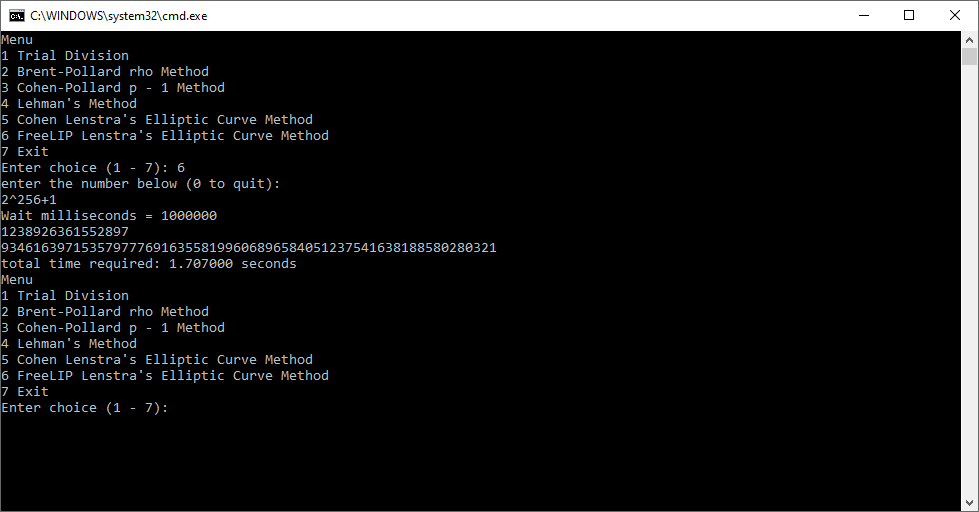

Video Blog Entries of Wednesday, March 16, 2021

